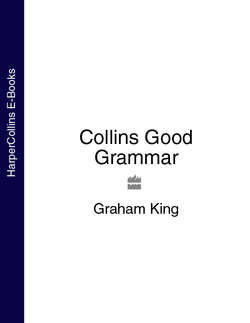Читать книгу Collins Good Grammar - Graham King - Страница 14
Simple, Compound and Complex Sentences
ОглавлениеApart from the subject/predicate concept of sentences, there is another way of classifying these constructions. Single-word expressions such as ‘Hey!’, signs, catchphrases, greetings and so on, are called irregular, fragmentary or minor sentences. Sentences that are constructed to express a complete, independent thought are called regular sentences, and these are divided into simple, compound and complex sentences. These are worth exploring because in writing and speaking we use them all the time. Knowing about them should help us use them to better advantage.
A simple sentence consists of a single main clause:
We went to Bournemouth last week.
The storm brought down all the power lines.
A compound sentence consists of two or more main clauses, indicated in bold:
The storm brought down all the power lines and caused havoc throughout Montreal.
Sam finally agreed to buy the car but still had doubts about the steering.
Both simple and compound sentences have one thing in common: neither have subordinate clauses (you’ll find more on clauses on page 58). When you add one or more subordinate clauses to the sentence mix, you create a complex sentence. In these examples the main clauses are in bold and the subordinate clauses are in parenthesis:
The spacecraft (that caused the emergency) was considered obsolete.
She bolted through the door (which slammed behind her).
My grandfather has now retired, but the family business (that he started in 1928) is still going strong.
The last example, consisting of two main clauses and a subordinate clause, is really a compound-complex sentence, one of the most common sentence constructions.
From these examples you’ll see that unlike simple sentences, compound and complex sentences express two or more thoughts. Let’s take two simple sentences:
The money was spent on urban regeneration. The money provided hundreds of families with excellent houses.
Most of us, seeing this pair of sentences, would find it difficult to resist the urge to combine them:
The money was spent on urban regeneration and it provided hundreds of families with excellent houses.
Compound and complex sentences link connected thoughts in an economical way. Indeed, a third thought could safely be added:
The money was spent on urban regeneration and provided hundreds of families with excellent houses, but it did not take funds away from existing public housing schemes.
Beyond this you have to be careful, or risk confusing or overloading the reader. By the way, did you notice the two words used to link the three thoughts or sentences into one? They are and and but, conjunctions that are commonly used to build compound and complex sentences. (See discussion under Grammatical Glue, page 138.)
